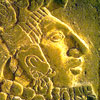Greatness, Goodness, And Unfailing Wisdom
 by James Allen
by James Allen
Greatness And Goodness
GOODNESS, simplicity, greatness — these three are one, and this trinity of perfection cannot be separated. All greatness springs from goodness, and all goodness is profoundly simple. Without goodness there is no greatness. Some men pass through the world as destructive forces, like the tornado or the avalanche, but they are not great; they are to greatness as the avalanche is to the mountain. The work of greatness is enduring and preservative, and not violent and destructive. The greatest souls are the most gentle.
Greatness is never obtrusive. It works in silence, seeking no recognition. This is why it is not easily perceived and recognized. Like the mountain, it towers up in its vastness, so that those in its immediate vicinity, who receive its shelter and shade, do not see it. Its sublime grandeur is only beheld as they recede from it. The great man is not seen by his contemporaries; the majesty of his form is only outlined by its recession in time. This is the awe and enchantment of distance. Men occupy themselves with the small things; their houses, trees, lands. Few contemplate the mountain at whose base they live, and fewer still essay to explore it. But in the distance these small things disappear, and then the solitary beauty of the mountain is perceived. Popularity, noisy obtrusiveness, and shallow show, these superficialities rapidly disappear, and leave behind no enduring mark: whereas greatness slowly emerges from obscurity, and endures forever.
Jewish Rabbi and rabble alike saw not the divine beauty of Jesus; they saw only an unlettered carpenter. To his acquaintances, Homer was only a blind beggar, but the centuries reveal him as Homer the immortal poet. Two hundred years after the farmer of Stratford (and all that is known of him) has disappeared, the real Shakespeare is discerned. All true genius is impersonal. It belongs not to the man through whom it is manifested; it belongs to all. It is a diffusion of pure Truth: the Light of Heaven descending on all mankind.
Every work of genius, in whatsoever department of art, is a symbolic manifestation of impersonal Truth. It is universal, and finds a response in every heart in every age and race. Anything short of this is not genius, is not greatness. That work which defends a religion perishes; it is religion that lives. Theories about immortality fade away; immortal man endures; commentaries upon Truth come to the dust; Truth alone remains. That only is true in art which represents the True; that only is great in life which is universally and eternally true. And the True is the Good; the Good is the True.
Every immortal work springs from the Eternal Goodness in the human heart, and it is clothed with the sweet and unaffected simplicity of goodness. The greatest art is, like nature, artless. It knows no trick, no pose, no studied effort. There are no stage-tricks in Shakespeare; and he is the greatest of dramatists because he is the simplest. The critics, not understanding the wise simplicity of greatness, always condemn the loftiest work. They cannot discriminate between the childish and the childlike. The True, the Beautiful, the Great, is always childlike, and is perennially fresh and young.
The great man is always the good man; he is always simple. He draws from, nay, lives in, the inexhaustible fountain of divine Goodness within; he inhabits the Heavenly Places; communes with the vanished great ones; lives with the Invisible: he is inspired, and breathes the airs of Heaven.
He who would be great let him learn to be good. He will therefore become great by not seeking greatness. Aiming at greatness a man arrives at nothingness; aiming at nothingness he arrives at greatness. The desire to be great is an indication of littleness, of personal vanity and obtrusiveness. The willingness to disappear from gaze, the utter absence of self-aggrandizement is the witness of greatness.
Littleness seeks and loves authority. Greatness is never authoritative, and it thereby becomes the authority to which the after ages appeal. He who seeks, loses; he who is willing to lose, wins all men. Be thy simple self, thy better self, thy impersonal self, and lo! thou art great! He who selfishly seeks authority shall succeed only in becoming a trembling apologist courting protection behind the back of acknowledged greatness. He who will become the servant of all men, desiring no personal authority, shall live as a man, and shall be called great. Forget thine own little self, and fall back upon the Universal self, and thou shalt reproduce, in living and enduring forms, a thousand beautiful experiences; thou shalt find within thyself that simple goodness which is greatness.
“It is as easy to be great as to be small,” says Emerson; and he utters a profound truth. Forgetfulness of self is the whole of greatness, as it is the whole of goodness and happiness. In a fleeting moment of self-forgetfulness the smallest soul becomes great; extend that moment indefinitely, and there is a great soul, a great life. Cast away thy personality (thy petty cravings, vanities, and ambitions) as a worthless garment, and dwell in the loving, compassionate, selfless regions of thy soul, and thou art no longer small—thou art great.
Claiming personal authority, a man descends into littleness; practicing goodness, a man ascends into greatness. The presumptuousness of the small may, for a time, obscure the humility of the great, but it is at last swallowed up by it, as the noisy river is lost in the calm ocean.
The vulgarity of ignorance and the pride of learning must disappear. Their worthlessness is equal. They have no part in the Soul of Goodness. If thou wouldst do, thou must be. Thou shalt not mistake information for Knowledge; thou must know thyself as pure Knowledge. Thou shalt not confuse learning with Wisdom; thou must apprehend thyself as undefiled Wisdom.
Wouldst thou write a living book? Thou must first live; thou shalt draw around thee the mystic garment of a manifold experience, and shalt learn, in enjoyment and suffering, gladness and sorrow, conquest and defeat, that which no book and no teacher can teach thee. Thou shalt learn of life, of thy soul; thou shalt tread the Lonely Road, and shalt become; thou shalt be. Thou shalt then write thy book, and it shall live; it shall be more than a book. Let thy book first live in thee, then shalt thou live in thy book.
Wouldst thou carve a statue that shall captivate the ages, or paint a picture that shall endure? Thou shalt acquaint thyself with the divine Beauty within thee. Thou shalt comprehend and adore the Invisible Beauty; thou shalt know the Principles which are the soul of Form; thou shalt perceive the matchless symmetry and faultless proportions of Life, of Being, of the Universe; thus knowing the eternally True thou shalt carve or paint the indescribably Beautiful.
Wouldst thou produce an imperishable poem? Thou shalt first live thy poem; thou shalt think and act rhythmically; thou shalt find the never-failing source of inspiration in the loving places of thy heart. Then shall immortal lines flow from thee without effort, and, as the flowers of wood and field spontaneously spring, so shall beautiful thoughts grow up in thine heart and, enshrined in words as molds to their beauty, shall subdue the hearts of men.
Wouldst thou compose such music as shall gladden and uplift the world? Thou shalt adjust thy soul to the Heavenly Harmonies. Thou shalt know that thyself, that life and the universe is Music. Thou shalt touch the chords of Life. Thou shalt know that Music is everywhere; that it is the Heart of Being; then shalt thou hear with thy spiritual ear the Deathless Symphonies.
Wouldst thou preach the living word? Thou shalt forego thyself, and become that Word. Thou shalt know one thing—that the human heart is good, is divine; thou shalt live on one thing—Love. Thou shalt love all, seeing no evil, thinking no evil, believing no evil; then, though thou speak but little, thy every act shall be a power, thy every word a precept. By thy pure thought, thy selfless deed, though it appear hidden, thou shalt preach, down the ages, to untold multitudes of aspiring souls.
To him who chooses Goodness, sacrificing all, is given that which is more than and includes all. He becomes the possessor of the Best, communes with the Highest, and enters the company of the Great.
The greatness that is flawless, rounded, and complete is above and beyond all art. It is Perfect Goodness in manifestation; therefore the greatest souls are always Teachers.
The Unfailing Wisdom
A MAN should be superior to his possessions, his body, his circumstances and surroundings, and the opinions of others, and their attitude towards him. Until he is this, he is not strong and steadfast. He should also rise superior to his own desires and opinions; and until he is this, he is not wise.
The man who identifies himself with his possessions will feel that all is lost when these are lost; he who regards himself as the outcome and the tool of circumstances will weakly fluctuate with every change in his outward condition; and great will be his unrest and pain who seeks to stand upon the approbation of others.
To detach oneself from every outward thing, and to rest securely upon the inward Virtue, this is the Unfailing Wisdom. Having this Wisdom, a man will be the same whether in riches or poverty. The one cannot add to his strength, nor the other rob him of his serenity. Neither can riches defile him who has washed away all the inward defilement, nor the lack of them degrade him who has ceased to degrade the temple of his soul.
To refuse to be enslaved by any outward thing or happening, regarding all such things and happenings as for your use, for your education, this is Wisdom. To the wise all occurrences are good, and, having no eye for evil, they grow wiser every day. They utilize all things, and thus put all things under their feet. They see all their mistakes as soon as made, and accept them as lessons of intrinsic value, knowing that there are no mistakes in the Divine Order. They thus rapidly approach the Divine Perfection. They are moved by none, yet learn from all. They crave love from none, yet give love to all. To learn, and not to be shaken; to love where one is not Loved: herein lies the strength which shall never fail a man. The man who says in his heart, “I will teach all men, and learn from none,” will neither teach nor learn whilst he is in that frame of mind, but will remain in his folly.
All strength and wisdom and power and knowledge a man will find within himself, but he will not find it in egotism; he will only find it in obedience, submission, and willingness to learn. He must obey the Higher, and not glorify himself in the lower. He who stands upon egotism, rejecting reproof, instruction, and the lessons of experience, will surely fall; yea, he is already fallen. Said a great Teacher to his disciples, “Those who shall be a lamp unto themselves, relying upon themselves only, and not relying upon any external help, but holding fast to the Truth as their lamp, and seeking their salvation in the Truth alone, shall not look for assistance to any besides themselves; it is they among my disciples who shall reach the very topmost height! But they must be willing to learn.” The wise man is always anxious to learn, but never anxious to teach, for he knows that the true Teacher is in the heart of every man, and must ultimately be found there by all. The foolish man, being governed largely by vanity, is very anxious to teach, but unwilling to learn, not having found the Holy Teacher within who speaks wisdom to the humbly listening soul. Be self-reliant, but let thy self-reliance be saintly and not selfish.
Folly and wisdom, weakness and strength are within a man, and not in any external thing, neither do they spring from any external cause. A man cannot be strong for another, he can only be strong for himself; he cannot overcome for another, he can only overcome of himself. You may learn of another, but you must accomplish for yourself. Put away all external props, and rely upon thy Truth within you. A creed will not bear a man up in the hour of temptation; he must possess the inward Knowledge which slays temptation. A speculative philosophy will prove a shadowy thing in the time of calamity; a man must have the inward Wisdom which puts an end to grief.
Goodness, which is the aim of all religions, is distinct from religions themselves. Wisdom, which is the aim of every philosophy, is distinct from all philosophies. The Unfailing Wisdom is found only by constant practice in pure thinking and well-doing; by harmonizing one’s mind and heart to those things which are beautiful, lovable, and true.
In whatever condition a man finds himself, he can always find the True; and he can find it only by so utilizing his present condition as to become strong and wise. The effeminate hankering after rewards, and the craven fear of punishment, let them be put away forever, and let a man joyfully bend himself to the faithful performance of all his duties, forgetting himself and his worthless pleasures, and living strong and pure and self-contained; so shall he surely find the Unfailing Wisdom, the God-like Patience and strength.
“The situation that has not its Duty, its Ideal, was never yet occupied by man. . .” Here or nowhere is thy Ideal. Work it out therefrom, and, working, believe, live, be free. The Ideal is in thyself, the impediment, too, is in thyself: thy condition is but the stuff thou art to shape that same Ideal out of. What matters whether such stuff be of this sort or that, so the form thou give it be heroic, be poetic? Oh, thou that pinest in the imprisonment of the Actual, and criest bitterly to the gods for a kingdom wherein to rule and create, know this of a truth: the thing thou seekest is already within thee, here and now, couldest thou only see!
All that is beautiful and blessed is in thyself, not in thy neighbor’s wealth. Thou art poor? Thou art poor indeed if thou art not stronger than thy poverty! Thou hast suffered calamities? Well, wilt thou cure calamity by adding anxiety to it? Canst thou mend a broken vase by weeping over it. or restore a lost delight by thy lamentations? There is no evil but will vanish if thou wilt wisely meet it. The God-like soul does not grieve over that which has been, is, or will be, but perpetually finds the Divine Good, and gains wisdom by every occurrence.
Fear is the shadow of selfishness, and cannot live where loving Wisdom is. Doubt, anxiety, and worry are unsubstantial shades in the underworld of self, and shall no more trouble him who will climb the serene altitudes of his soul. Grief, also, will be forever dispelled by him who will comprehend the Law of his being. He who so comprehends shall find the Supreme Law of Life, and he shall find that it is Love, that it is imperishable Love. He shall become one with that Love, and loving all, with mind freed from all hatred and folly, he shall receive the invincible protection which Love affords. Claiming nothing, he shall suffer no loss; seeking no pleasure, he shall find no grief; and employing all his powers as instruments of service, he shall evermore live in the highest state of blessedness and bliss.
Know this: — thou makest and unmakest thyself; thou standest and fallest by what thou art. Thou art a slave if thou preferrest to be; thou art a master if thou wilt make thyself one. Build upon thy animal desires and intellectual opinions, and thou buildest upon the sand; build upon Virtue and Holiness, and no wind nor tide shall shake thy strong abode. So shall the Unfailing Wisdom uphold thee in every emergency, and the Everlasting Arms gather thee to thy peace.
“Lay up each year thy harvest of well-doing,
Wealth that kings nor thieves can take away.
When all the things thou callest thine, goods, pleasures, honours fall,
Thou in thy virtue shalt survive them all.”
Excerpt from All These Things Added
Posted in Other Topics, Spiritualitywith comments disabled.





